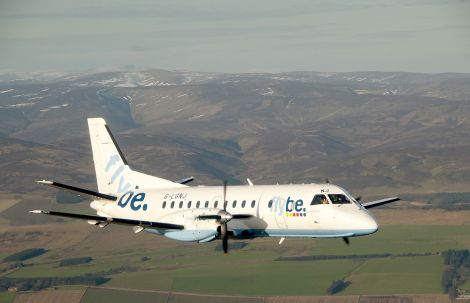News / Boyle: Loganair on track to banish its troubles
LOGANAIR is “well on the way” to addressing the technical and maintenance problems caused a huge spike in delays over the past year, its operations director has said.
Speaking at Shetland’s external transport forum meeting on Monday, Maurice Boyle acknowledged it had been a “most challenging year” for the airline, which operates flights between the islands and the Scottish mainland in a franchise arrangement with budget airline Flybe.
Boyle gave a generally well-received presentation at Lerwick Town Hall, outlining how the loss of some key engineering staff had been at the root of the problems.
A recruitment programme, due to be completed at the end of this month, will result in a total of 146 engineering staff – a quarter of Loganair’s overall workforce – being in place.
“There was a significant increase in lengthy delays and that leads to a loss of customer confidence, which we’re all aware of,” Boyle said.
“We’re pretty well on the way to addressing all the issues. It’s in our own interests to get this back on track, and that’s what we’re going to do in 2016.”
In the 2015 calendar year, 78.5 per cent of flights to and from Sumburgh departed within 15 minutes – some way short of Loganair’s target of 85 per cent.
Changes, such as the introduction of a new spare parts hub in Glasgow, began being implemented in the autumn. January’s performance was, in Boyle’s words, “not stunning” at 74 per cent punctuality, but February’s rate of 83 per cent “suggests that we’re on the right track now”.
He said some 68 flights were delayed by three hours or more in 2015 – a three-fold increase on the previous year. Three hours is the threshold at which the airline is obliged to pay 250 Euros in compensation to any passenger who applies.
Become a member of Shetland News
Four flights fell into that category in January, but there were none in February.
Boyle acknowledged that improvements in recent weeks were “improvements from a relatively low level” and the airline would continue to have “difficult weeks”, one of which was last week, but “gradually we’re seeing more good days stitched together”.
He also accepted the airline could do more to ensure staff, particularly at mainland airports, communicated better with passengers in the event of delays.
SIC councillor Jonathan Wills said he and others who had been critical of Loganair’s performance would be pleased to see the airline “has listened to the public and done something about it”.
“Don’t say ‘operational reasons’, tell us what the problem is,” he said. “We’re grown-ups. Be specific, and then you’ll win trust.”He said ground staff at Edinburgh, Aberdeen and Glasgow airports – an operation outsourced to Menzies Aviation – “don’t seem to show much interest, and the announcements are few and far between”.
SIC councillor Alastair Cooper, meanwhile, referred to a day of delays caused by strong gales a few weeks ago where the pilot had come into the departure lounge “and explained to passengers what his challenges were, and they agreed with him – stay on the ground! Everyone walked out the door as happy as could be because they understood the problem.”
Asked what was likely to replace its Saab aircraft when they reach the end of their shelf-life, Boyle said it was difficult because no manufacturers were building aircraft with 50 seats or less.
He said the Saab had “fantastic crosswind capability, which is really important for maritime islands”.
When Loganair representatives speak to manufacturers, they are told there isn’t the global demand in an industry where “they need to build approximately 500 units” at a time.
“There isn’t an obvious answer,” Boyle said, but with planes being stripped back to their basic shell and renewed every 18 months, it “isn’t an issue for tomorrow”.
Asked why its fares had not reduced in the wake of a tumble in global oil prices, Boyle said aviation fuel only accounted for 15 per cent of its operating costs.
“The price of jet fuel does fall in line with the falling price of oil,” he added, “but we’ve increased our base fares by one per cent, and we do offer a range of incentives. It’s not in our interest to price ourselves out of the market.”
Become a member of Shetland News
Shetland News is asking its readers to consider paying for membership to get additional perks:
- Removal of third-party ads;
- Bookmark posts to read later;
- Exclusive curated weekly newsletter;
- Hide membership messages;
- Comments open for discussion.
If you appreciate what we do and feel strongly about impartial local journalism, then please become a member of Shetland News by either making a single payment, or setting up a monthly, quarterly or yearly subscription.






























































